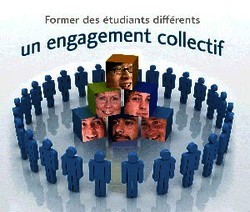Developing a Different Kind of Student – A Collective Commitment
How often do you hear that students aren’t what they were in our day? They don’t have our approach to life; they don’t open a book and they spend all their time on the Internet. Philippe Meireu opens the AQPC (Association québécoise de pédagogie collégiale) Symposium with a keynote address that examines how much of this is oversimplification and how much is simple repetition.
For more than a century, academics have insisted on the necessity of ‘individualized schooling’. And, for all this time there has been resistance to the idea. Why now is there renewed interest in this concept? First let’s look at the pertinence of the word ‘difference’ and at how it is used and under what circumstances. How can we recognize differences and yet establish common goals? What academic, social or shall we say political model at its most noble can rise to the challenge of diversity?
In this original approach to the theme of the symposium, Philippe Meiriue shows its timeliness and timelessness simultaneously.
The organizing committee of the symposium has created a program that explores diversity from many angles and proposes solutions that take academics into account, examining course materials and cooperation between instructors and other members of the academic team.

Poster of the workshop Former des étudiants différents : un engagement collectif
There are a total of 114 workshops on the program over the three days of the symposium. Sixteen additional 20 minute activities are slated for the Idea Fair. There are a total of 14 activities either presented in English or offering bilingual documentation. The symposium program, which can list English activities as a ‘Theme’, is now available for perusal.
The symposium will be the scene of several major events:
- Le Rendez-vous des conseillers pédagogiques will be an opportunity to focus on training teams of teachers and IT integration.
- Le Rendez-vous de l’internationalisation will examine college policies in internationalization.
- Le Rendez-vous des Maîtres will publicize the work of graduates of the PERFORMA program including those who are using IT in class.
- Finally, la Journée de la réussite organized by the CAPRES (Consortium d’Animation sur la Persévérance et la Réussite en Enseignement Supérieur) and the Carrefour de la réussite will deal with how academic reform in the secondary schools is progressing and the transition from the old to the new methodology.
The Rendez-vous activities, as the name suggests, are offered in French.
Profweb will be holding an activity looking to promote communication between Humanities Departments in anglophone cégeps using IT. A special place has been made for the new Sciences humaines program. Besides the two official activities of the Rendez-vous des sciences humaines, 14 communications will present academic experiments in the discipline.Sciences de la nature will not be neglected either. There will be activities looking at laboratories and scientific experimentation as well as the integration of environmental concerns into classes.

Banner of the 28th AQPC symposium
We are striving to make this year’s symposium a waste efficient and carbon neutral event. Paper use will be held to a minimum, and waste will be recycled. Greenhouse gas emissions will be reduced, and those that cannot be eliminated will be measured in order that their long term effects can be eliminated.
Our ecological project and our academic event are both becoming a reality using IT integration. The symposium program contains more than thirty activities featuring new technology or technology supported perdagogical strategies or collaborative activities. Link here to the workshop listings which are divided into three categories: learning based IT, IT for teachers and IT teaching materials.
Our symposium is about diversity and change and is looking to make changes in our ecological practices as well as in our teaching. Your comments will help us to be more pertinent and efficient. We welcome your comments and your presence at Victoriaville June 4-6, 2008.

